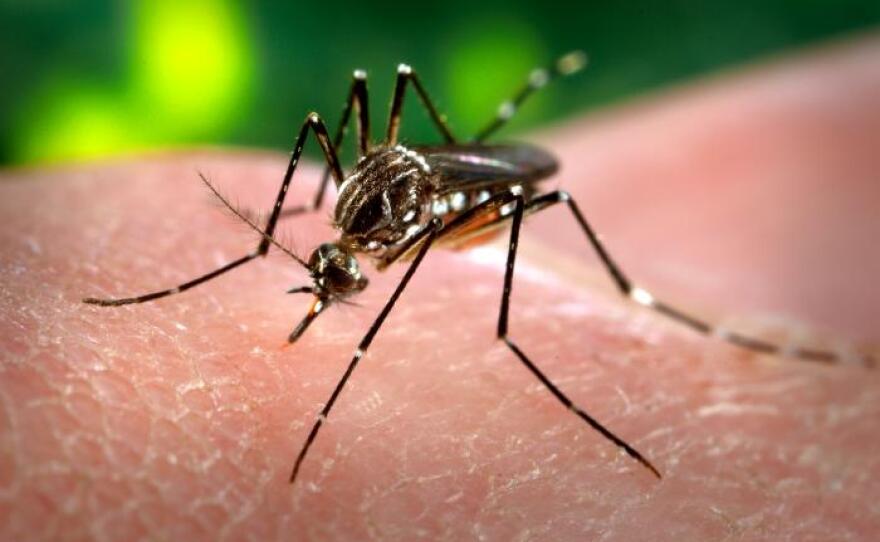The Zika Virus is on the move. Here's what you need to know.
As Zika virus continues to spread rapidly throughout the Americas, New York U.S. Senator Kirsten Gillibrand today urged the National Institutes of Health’s National Institute of Allergy and Infectious Diseases to take immediate action to combat the virus' spread.
In a letter sent to the agency’s director, Gillibrand asked that research on ways to combat the spread of the virus be given top priority. Zika has reached at least 24 nations and has been contracted by roughly a dozen Americans, including one in Massachusetts and a handful in New York. All victims had traveled to areas where Zika is known to have a presence. Time Waner Cable News interviewed Dr. John Treanor, chief of infectious diseases at Rochester's Strong Memorial Hospital, who says only an Aedes mosquito can transmit the virus. "There are two species of aedes mosquitoes, aedes aegypti and aedes albopictus in the United States that would have the potential to transmit Zika virus. So far, those mosquitoes are not known to live in New York state. So we would not expect to see transmission in New York State by those mosquitoes."
At the epicenter of the outbreak, Brazilian authorities strain to control the mosquitoes that spread the virus while families struggle with birth defects that may be linked to the disease. On the World Health Organization’s YouTube channel, Epidemiologist Erika Garcia addresses public health concerns. "In the beginning, when we first knew about this disease, in the 1940s throughout 2007 it's very mild. Fever, rash, conjunctivitis, which is the reddening of the eye. We can have muscle and joint pain. So basically self-limiting. Now with this virus what we're seeing is that there's a question whether there are severe complications with Zika virus. And that can include a neuroligical type of complication like Guillain-Barré syndrome, which is the weakening of muscles. Also there is a question whether there's any association with Zika virus and congenital malformations like microcephaly. Right now in Brazil, they are reporting increases of microcephaly cases."
WHO warns that the virus is spreading “explosively” through the Americas, with one estimate that there could be as many as 4 million infections across the continent over the next year.
Canada's chief public health officer says four Canadians including one from Quebec have recently returned home from trips abroad with the Zika virus. Two have completely recovered. Mosquitoes that transmit the virus are said to be not adaptable to the Canadian climate. The World Health Organization says Canada and Chile are the only two countries in the Americas where the virus is not likely to spread.
Back on this side of the border, despite confirmed cases in Orange, Queens, Nassau and Monroe counties, New York State Heath Commissioner Howard Zucker said in a statement, "There is virtually no risk of acquiring Zika virus in New York State at this time as the virus cannot be spread by casual contact with an infected person and mosquitoes are not active in cold winter months."
Massachusetts Congressman Richard Neal Friday commented on the federal government's response to concerns about the Zika virus, speaking to WAMC in Holyoke. "I hope that the World Health Organization, in it's analysis, will rely also upon the National Institutes of Health and the Centers For Disease Control, the CDC. I think they can be very important in helping to develop a response. I had a chance just during the course of the last few days to witness some of the tragedy. And I think that there's an opportunity for us here in America to assist those who are going to be afflicted or avoid being afflicted by this dreadful disease."
There is no specific treatment for Zika and no vaccine.
Big Zika Virus Outbreak Unlikely In The U.S., Officials Say
Where has Zika virus been found?
- Prior to 2015, Zika virus outbreaks have occurred in areas of Africa, Southeast Asia, and the Pacific Islands.
- In May 2015, the Pan American Health Organization (PAHO) issued an alert regarding the first confirmed Zika virus infections in Brazil.
- Currently, outbreaks are occurring in many countries.
- Zika virus will continue to spread and it will be difficult to determine how the virus will spread over time.







